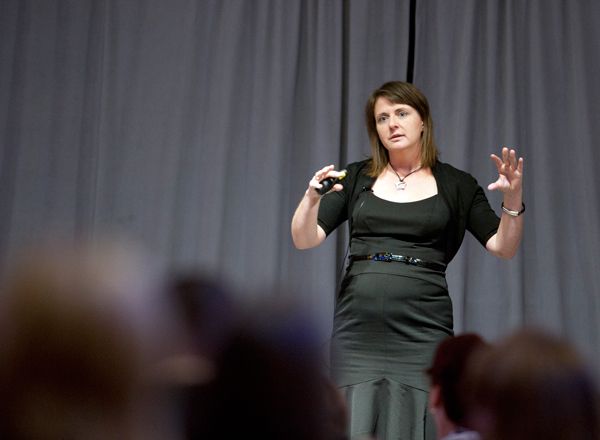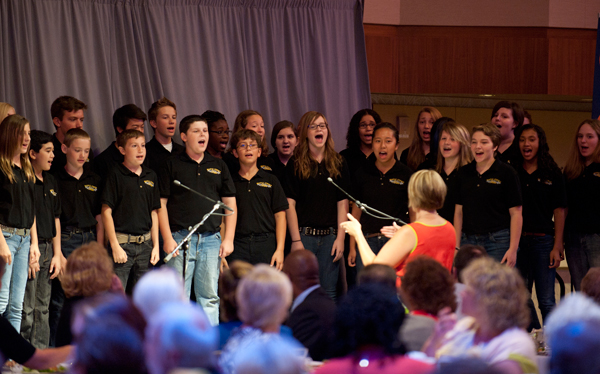Redesigning education to prepare youngsters for changes ahead
At least 500 people were at the Radisson when the Kalamazoo Community Foundation presented new ideas on ways the community might go as it becomes a place where education is the number one priority. Disruptions lie ahead.
Getting your Trinity Audio player ready...
“The future is not a fixed point. It is ours to create.” — KnowledgeWorks
Many of those who care about education in Kalamazoo got a glimpse of what the future may hold for students and teachers.
And they learned that if they don’t like what that glimpse shows them they can be part of designing new ways of educating young people as new systems develop.
At the annual meeting for the Kalamazoo Community Foundation Katherine Prince from KnowledgeWorks in Cincinnati, Ohio, an organization that works in many ways to improve student readiness for college and careers, presented the highlights of some of the changes her organization sees ahead and she urged the community to design educational systems that would address those changes.
“This is an opportunity to say ‘What is possible?'” Prince says. “What if learning were adapted to every child? This is the potential we see in the latest forecast.”
Prince explains that just as Amazon.com has changed or disrupted retail shopping, big societal shifts are coming that will change the way students learn and educators teach.
Prince acknowledges that the some of the trends KnowledgeWorks foresees for education are exciting and others are unsettling. But communities can create the outcomes they want for learners if they face the disruptions in education rather than respond to them with “fear and dread,” Prince says.
The way students are educated in the United States primarily was designed at the time in the nation’s history when the country was moving from an agricultural to an industrial economy. Students needed to have access to a standard education that would allow them to move right into a job. Education today needs to be more creative, Prince says.
“What if you could reinvent learning for today’s needs?” Prince asked. “What if we could do a system redesign?”
One of the changes in society that system redesign could address is that increasingly students will be designing their own learning paths, what Prince describes as an educational playlist.
Currently children move up a grade as they get older. In a redesigned education system they may instead proceed to another level when they are ready. They may move ahead if they have learned their lessons before others or they may wait until they have mastered the information.
Today’s schools are taking many forms. Homeschooling is empowering families to make educational decisions that make sense for them. And public charter schools are being designed to appeal to a specific set of learners, such as one in New York City in which classes mimic the action and design principles of games and students move to the next level as they would in a game instead of moving from the sixth grade to the seventh grade, for example.
At another school, this one in Boston, students are tested every 11 weeks to determine what they have learned and groups of learners are formed based on their needs. Those groups reform after each test.
Noodle, the first education specific search engine, was created as theses kinds of options for learning continue to proliferate, Prince says.
“We are going to see radical personalization as learners and their families make these kinds of choices,” Prince says.
Not only will schools take many forms but teachers will be those in the classroom and beyond. Prince calls these “learning agents” and they include developers and technology experts who will help create technologies that can measure learning and help teachers know when students understand what is being taught and when more instruction is needed. A blend of online learning and classroom instruction could be part of the redesign as it now being put in place in a growing number of universities.
Students also need to be prepared for the reality that full-time employment will continue to decline and workers will increasingly be hired for short-term jobs. Students need to be prepared for “mosaic careers,” Prince says.
The key skills they will need for future employment will be the ability to embrace change, appreciation of experimentation, problem solving and the ability to quickly analyze information. Young people must be trained to expect continuous learning and manage disruptions.
A number of community members raised concerns that many of the solutions offered did not take into account the deepening digital divide between those with ready to access to computers and computer skills and those who do not have that access. Prince says since many solutions that rely heavily on technology are cheaper than other solutions one outcome could be that those with less financial resources get less human support — unless the community is careful to design its educational systems so that does not happen.
To those who said that many Prince’s examples dealt with the tools of education rather than the fundamentals of what it means to be educated, Prince responds that the community must design a solution that is right for it and that recognize there are many right answers.
“There is no one-size-fits-all solution,” Prince says. “We have to put all the resources that we have at our disposal toward getting clear about who we are doing this for and work with that.”
Reinforcing the idea that those in the room are part of the redesigning the educational system, Prince asked: “How can you as individuals support cradle to career education and lifelong learning for all?”
Kathy Jennings is the managing editor of Southwest Michigan’s Second Wave. She is a freelance writer and editor.
Photos by Erik Holladay.
MORE ON DISRUPTIONS THAT WILL CHANGE EDUCATION
KnowledgeWorks has identified five disruptions that it forecasts will change the way education takes place in the same way that Apple’s iTunes have changed the landscape of the music world.
It describes disruptions as “major societal shifts that will have broad impact on the future of learning.” Its forecasts build on work done by the Institute for the Future.
And in its report Recombinant Education: Regenerating the Learning Ecosystem KnowledgeWorks says: “The future is not a fixed point. It is ours to create. This forecast previews five disruptions that will reshape learning over the next decade. Responding to them with creativity rather than fear will be critical to preparing all learners for an uncertain future.”
The forecast goes on to say:
“At its best, recombinant education will discover diverse organizational forms and learning formats that find many ways to integrate talent, community assets, and global resources in support of student-centered learning. New ways of re-assembling what seem like disparate pieces — and of incorporating new kinds of inputs — have the potential to usher in a world of learning that provides rich personalization for every learner throughout a lifetime.
“Of course, less promising alternatives are also possible. If we do not effectively engage in ongoing education recombination, we risk letting the disruptions of the coming decade perpetuate inequities for learners, undermine the learning ecosystem’s capacity to adapt, and narrow the impact of education innovations by keeping them largely uncoordinated, opportunistic, and fragmented. The choice is ours to make, and the future ours to shape. What will be the future of learning in your organization, community, or region?”
The “disruptions” identified by KnowledgeWorks are:
DEMOCRATIZED STARTUP
Transformational investment strategies and open access to startup knowledge, expertise, and networks will seed an explosion of disruptive social innovations.
Trend: Demystifying the Startup — The building blocks of entrepreneurship and the makings of viable startups are being decoded and shared broadly, increasing entrepreneurs chances for success.
Trend: Matchmaking Networks — New social, financial and networking platforms will create entrepreneurial communities that connect education entrepreneurs with funders and market opportunities.
Trend: Innovative public, private and institutional investment mechanisms will maximize social benefit and collective impact as well as economic return.
HIGH-FIDELITY LIVING
As big data floods human sensemaking capacities, cognitive assistants and contextual feedback systems will help people target precisely their interactions with the world.
Trend: Digitized Decisions — Highly sophisticated learning analytic tools will integrate multiple data streams about learners, including their social and emotional conditions, to predict performance and suggest personalized strategies for success.
Trend: Extended Self — In augmenting human capacity to think and do, the use of cognitive prosthetics and social bots will become the norm for making sense of information and will blur the line between individuals and their tools and networks.
Trend: Reading your mind — Sophisticated decryption of brain signals under varying environmental conditions and during different cognitive tasks will improve the design of learning environments and experiences for attention, focus, creativity, and motivation.
DE-INSTITUTIONALIZED PRODUCTION
Activity of all sorts will be increasingly independent of institutions as contributions become more ad-hoc, dynamic, and networked.
Trend: The Rise of Socialstructs — Radically expanded options to architect massive collaborations in diverse technical and social settings will open new opportunities for creating, scaling, and sustaining efforts that both supplement and supplant traditional organizational models.
Trend: The Decline of the FTE — Full-time employment in a single institution or industry will decline as social production networks aggregate contributions from volunteers and pay-for-performance workers around the world.
Trend: DIY Credentialing –The increasing necessity of self-directed lifelong learning will make flexible credentials meaningful and will drive new tools and practices for communicating accomplishments.
CUSTOMIZABLE VALUE WEBS
Innovative, open business models will leverage complex networks of assets and relationships to create ultra-customer-centric experiences across industries.
Trend: Digital Mediators and Brokers — Web service brokers, interactive maps, APIs, and technical standards will become essential tools for helping learning agents, learners, and parents find, organize, and curate learning resources and experiences.
Trend: Agile Schools — As the costs of coordinating learning resources and convening learning communities decline rapidly, diverse and flexible forms of hyper-focused schools will multiply.
Trend: Transmedia Learning Productions — Like Hollywood production teams, transmedia learning networks and free platforms will provide access to celebrity learning agents, offer compelling curriculum, and structure vibrant blockbuster learning environments that integrate multiple digital media formats.
SHAREABLE CITIES
Next gen cities will drive social innovation, with urban infrastructure shaped by patterns of human connection and contribution.
Trend: Context-Aware Cities — Networks, apps, and other platforms will provide real-time feedback to residents, improving their access to services while helping to integrate urban structures and solutions both locally and regionally.
Trend: Hacking the City — As state, regional, and federal supports lag behind urban needs, local and collaborative activity will drive urban innovation, revitalization, and micro economies from the ground up.
Trend: Inside-Out Urban Schools — Close partnerships and data sharing with civic organizations will create robust urban learning landscapes that weave learning throughout the community, expanding and integrating access to learning resources.
To read the whole forecast, including a more full description of the trends KnowledgeWorks sees ahead and what it calls signals, examples, or early indicators, of how each trend is beginning to play out today, please visit here.


















